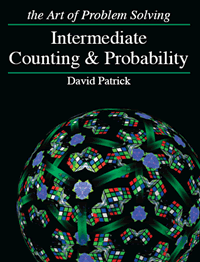Need Help?
Need help finding the right class? Have a question about how classes work?
Intermediate Counting & ProbabilityTopics in discrete mathematics, including clever one-to-one correspondences, principle of inclusion-exclusion, generating functions, distributions, the pigeonhole principle, induction, constructive counting and expectation, combinatorics, systems with states, recursion, conditional probability, and introductory graph theory. |
18 weeks |
| 18 weeks ARE YOU READY? DO YOU NEED THIS? SYLLABUS |
Schedule
|
Sunday
Feb 25 - Jun 30 |
7:30 - 9:00 PM ET
Feb 25 - Jun 30
7:30 - 9:00 PM Eastern 6:30 - 8:00 PM Central 5:30 - 7:00 PM Mountain 4:30 - 6:00 PM Pacific Click here to see more time zones |
Dan Kneezel |
$560
(~$32/week)
$616 w/books
|
$560
(~$32/week)
CLOSED
With Books $616
|
|
Wednesday
Mar 20 - Jul 17 |
7:30 - 9:00 PM ET
Mar 20 - Jul 17
7:30 - 9:00 PM Eastern 6:30 - 8:00 PM Central 5:30 - 7:00 PM Mountain 4:30 - 6:00 PM Pacific Click here to see more time zones |
Jeffery Yu |
$560
(~$32/week)
$616 w/books
|
$560
(~$32/week)
CLOSED
With Books $616
|
|
Monday
May 13 - Sep 23 |
7:30 - 9:00 PM ET
May 13 - Sep 23
7:30 - 9:00 PM Eastern 6:30 - 8:00 PM Central 5:30 - 7:00 PM Mountain 4:30 - 6:00 PM Pacific Click here to see more time zones |
Dan Kinch |
$560
(~$32/week)
$616 w/books
|
$560
(~$32/week)
ENROLL
With Books $616
|
|
Sunday
Jun 30 - Nov 3 |
7:30 - 9:00 PM ET
Jun 30 - Nov 3
7:30 - 9:00 PM Eastern 6:30 - 8:00 PM Central 5:30 - 7:00 PM Mountain 4:30 - 6:00 PM Pacific Click here to see more time zones |
Jacob Guo-Xue |
$560
(~$32/week)
$616 w/books
|
$560
(~$32/week)
ENROLL
With Books $616
|
|
Tuesday
Sep 17 - Feb 4 |
7:30 - 9:00 PM ET
Sep 17 - Feb 4
7:30 - 9:00 PM Eastern 6:30 - 8:00 PM Central 5:30 - 7:00 PM Mountain 4:30 - 6:00 PM Pacific Click here to see more time zones |
TBA |
$560
(~$32/week)
$616 w/books
|
$560
(~$32/week)
ENROLL
With Books $616
|
|
Thursday
Nov 7 - Mar 27 |
7:30 - 9:00 PM ET
Nov 7 - Mar 27
7:30 - 9:00 PM Eastern 6:30 - 8:00 PM Central 5:30 - 7:00 PM Mountain 4:30 - 6:00 PM Pacific Click here to see more time zones |
TBA |
$560
(~$32/week)
$616 w/books
|
$560
(~$32/week)
ENROLL
With Books $616
|
AoPS Holidays
There are no classes May 25 ‐ 27, July 4, August 30 ‐ September 2, October 31, November 25 ‐ December 1, and December 21, 2024 ‐ January 3, 2025.
Who Should Take?
Students should have a complete mastery of basic counting as described in the diagnostic test above before taking this course. Students should also have a solid algebra background through our Intermediate Algebra class (or a typical honors Algebra 2 class and some Precalculus). Students who have completed the Art of Problem Solving Intermediate Algebra and Introduction to Counting & Probability classes should feel comfortable taking this class. (However, students are not required to take these classes before taking Intermediate Counting & Probability - use the diagnostic test above to determine if this class is right for you.)Lessons
| Lesson 1 | Review of Counting and Probability Basics |
| Lesson 2 | Principle of Inclusion & Exclusion |
| Lesson 3 | Advanced Inclusion & Exclusion |
| Lesson 4 | Constructive Counting |
| Lesson 5 | One-to-one Correspondences |
| Lesson 6 | One-to-one Correspondences Continued and Pigeonhole |
| Lesson 7 | Constructive Expectation |
| Lesson 8 | Distributions |
| Lesson 9 | Mathematical Induction and Fibonacci Numbers |
| Lesson 10 | Recursion and Catalan Numbers |
| Lesson 11 | Conditional Probability |
| Lesson 12 | Combinatorial Identities |
| Lesson 13 | Events with States |
| Lesson 14 | Generating Functions, Week 1 |
| Lesson 15 | Generating Functions, Week 2 |
| Lesson 16 | Graph Theory, Week 1 |
| Lesson 17 | Graph Theory, Week 2 |
| Lesson 18 | Bonus Topics and Challenging Problems |
Required Textbook

|
Intermediate Counting & Probability
An intermediate textbook in counting and probability for students in grades 9-12, containing topics such as inclusion-exclusion, recursion, conditional probability, generating functions, graph theory, and more.
Related course: Intermediate Counting and Probability |









